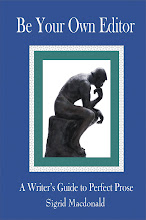I used
Grammarly to grammar check this post because extra time spent proofreading could be time
spent watching Dexter!
Constructive Criticism about Your Writing
Hardly anyone
likes criticism. It is rare for someone to say, "Go ahead and insult me. Tell
me everything you don't like about me. Bring it on." It almost feels
masochistic to be enthusiastic about receiving a put-down. We are social
creatures. We strive to please, and we bask in praise and approval. That is why
it is often hard to give essays, articles, or book-length manuscripts to
someone for a second opinion. We do not want people laughing at us, picking out
our faults, or misunderstanding our message. But there are exceptions to this
rule. Children and adults accept input from teachers because the latter have
more knowledge about a particular subject. We usually accept constructive
criticism from a professional because we view them as authorities. So, when
should you accept critical feedback about your writing and when should you
disregard it?
First, you do not
always need a professional to evaluate your essay or manuscript, although
sometimes that can be helpful. But much of the time you can present your
material to a trusted friend, colleague, or family member; or you can post your
short story or parts of your novel on certain writing forums and receive excellent
feedback from fellow writers.
Second, no matter
whom you choose to share your material with, ask yourself if you respect that
person's writing. Are they smart, literate, and kind? Do they have your best
interests at heart? Do they understand your genre and audience? If you are
writing science fiction and you give your manuscript to someone who has
published four books on anatomy and physiology, that person may not be the best
judge of your work.
Third, before
reading comments about your unpublished work, put yourself in a Zen frame of
mind. Detach from the outcome. Resolve not to get upset or be offended. Try to
act as though your reader has provided feedback on someone else's manuscript. If
this is someone who cares about you, they will not want to hurt you, and as a
result, hopefully they will be as tactful as possible. Ask yourself if the
criticism rings true. Did you confuse points of view in your story? Are certain
parts redundant, boring, or irrelevant? Be honest with yourself. The only one
who stands to benefit is you.
Last, do not go to
Amazon looking for useful feedback on your published material. Some people on
Amazon love to book bash. Ditto for reviewers or certain blogs. Once you have
published your book, choose reviewers who are highly rated as impartial and
professional. Even then, do not take a negative review to heart. Some bestsellers
receive terrible reviews – Fifty Shades
of Grey comes to mind – and those mixed reviews have not affected sales
adversely at all! That is because I may love a certain book and you may hate
it, but our combined opinions have little to do with the objective value of the
book.
So, do your best
writing your manuscript and when it is time to hand it over for evaluation,
choose your readers carefully and establish a confident mindset so that you can
hear what they are saying without feeling or hurt or angry, and then just dismiss
feedback that is not relevant or helpful.
Happy writing.
Sigrid Mac, Author of Be Your Own Editor


